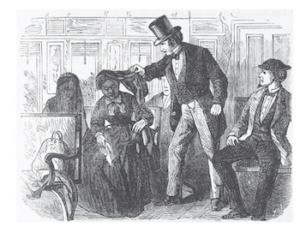
Charlotte L. Brown (on the street car)
*Charlotte L. Brown's birth is celebrated on this date in 1839. She was a Black educator and activist.
She was born in Maryland, the daughter of James E. Brown, a slave, and Charlotte Brown, a free seamstress. Her mother purchased her father’s freedom, and in 1850, they were living as Free people of color in Baltimore, Maryland, with several children, including her.
Sometime between 1850 and 1860, the family moved to San Francisco, where the city's black population was 1,176 or about 2 percent. In San Francisco, James E Brown ran a livery stable, was a partner in the black newspaper Mirror of the Times, an antislavery crusader, and a member of the San Francisco Literary Society, a discussion and debate group for prominent Black men. In 1855, Charlotte was the teenage bridesmaid at the San Francisco wedding of her sister Margaret, who married the wealthy Black entrepreneur George Washington Dennis.
On April 17, 1863, Charlotte Brown sat on a horse-drawn streetcar one block from her home on Filbert Street in San Francisco. She was on her way to see her doctor. The Omnibus Railroad Company owned the streetcar. When the streetcar conductor approached her and asked her to leave, Brown said she "had a right to ride" and had no intention of leaving the car. The conductor, Thomas Dennison, asked her several times to go, and each time she refused. Finally, when a white woman objected to her presence, he grabbed her by the arm and escorted her out of the car.
Her father hired attorney W. C. Burnett, and Charlotte Brown brought a lawsuit against the Omnibus Railroad Company for $200. In January 1865, a jury awarded Brown $500. The Omnibus Railroad Company appealed the verdict but was refused another trial.
In 1867, Charlotte Brown opened a school for young children at 10 Scotland Street in San Francisco, offering "all the branches of primary education" as well as music and embroidery. In 1874, she married James Henry Riker, another prominent African American activist of San Francisco, who had worked as a live-in personal servant to William Chapman Ralston and was a steward at the Palace Hotel during their marriage. Riker, along with Brown's father, was one of the organizers of the 1865 California State Convention of Colored Citizens.
The society pages of The Elevator, a Black newspaper, printed an announcement in 1877 of a surprise party for a fellow steward at the Palace Hotel given by Charlotte and James H Riker in their residence on 1018 Powell Street in San Francisco. Little is known about Charlotte Brown Riker's life after that time.